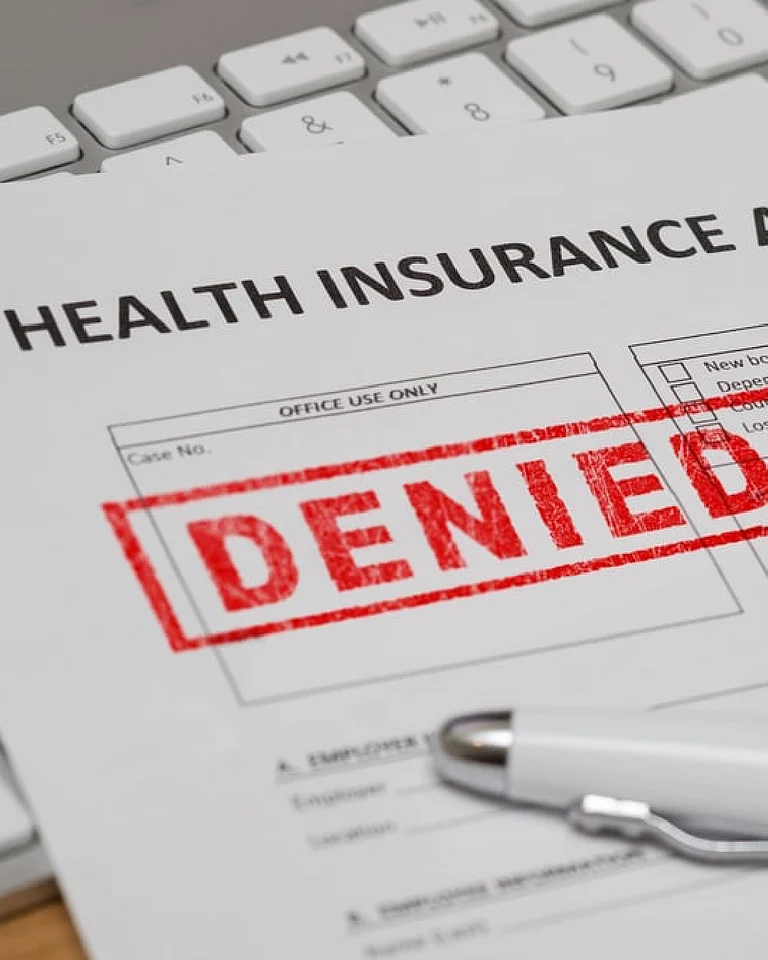Imagine being in a medical emergency, relying on your health insurance to cover the bills, only to find out that your claim has been rejected. It’s a nightmare scenario, but for lakhs of policyholders in India, it was a reality last year.
Health Insurance Claims Worth Over Rs 26 Crore Denied In FY24; Is Your Policy At Risk?
Every policyholder expects his/her claim to be honoured at the time of medical emergencies. However, these numbers highlight a growing concern. Here’s what policyholders can do in the event of claim rejections or delays.
Per the government data released in a query to Lok Sabha, insurers (both public and private combined) denied health insurance claims worth Rs 26,037.65 crore in the financial year (FY) 2023-24. This includes Rs 15,100.14 crore in claims disallowed based on policy terms and conditions and Rs 10,937.17 crore outright rejected by insurance companies.
Where The Most Claims Were Denied;
The data varies for both public, private, and stand-alone insurers.
Among the public sector giants, New India Assurance rejected most claims amounting to Rs 7,038.04 crore, which included Rs 4,86,3.9 crore disallowed as per the policy terms and Rs 2,177.05 crore repudiated outright.
Other public insurers, namely;
United India Insurance disallowed claims worth Rs 1,340.21 crore and repudiated Rs 613.46 crore. Oriental Insurance disallowed claims worth Rs 62.06 crore while repudiating claims worth Rs 17.93 crore.
Lastly, National Insurance disallowed claims amounting to Rs 60.61 crore and repudiated Rs 13.43 crore.
The private sector general insurers collectively rejected claims worth over Rs 8,00,00 crore. Among these, ICICI Lombard General Insurance rejected most claims (approx. Rs 20,16.81 crore, including both disallowments vis-a-vis policy terms and coverage and the repudiated ones.
Others, including Bajaj Allianz General Insurance and Tata AIG General Insurance, rejected claims worth Rs 103.99 crore and Rs 49.22 crore respectively.
Standalone health insurers rejected a total of Rs 7,75,08 crore (Rs 4,56.09 crore disallowed plus Rs 3,19.32 crore repudiated). For instance, ManipalCigna Health Insurance and Niva Bupa Health Insurance rejected claims amounting to (approx.) Rs 104.99 crore and Rs 94.99 crore respectively.
Every policyholder expects his/her claim to be honoured at the time of medical emergencies. However, these numbers highlight a growing concern - how easy is it for insurers to reject claims?
MPs Balashowry Vallabhaneni and Advocate Dean Kuriakose, in their queries, asked the government whether the terms and conditions of health insurance companies run into many pages with very small font sizes, which frustrates those who want to take policy.
They pointed out that many customers simply sign on the dotted line without going through the T&Cs, which makes them vulnerable to claim rejections.
Responding to this, Pankaj Chaudhary, Union minister of state for finance, said the Insurance Regulatory and Development Authority of India (Irdai) has introduced several consumer-friendly measures, including;
Customer Information Sheet (CIS): Last year, the insurance regulatory body released a circular asking insurers to present policies with CIS documents which would include details of coverage offered, exclusions, sub-limits/deductibles, capping, the waiting period(s), etc.
Moreover, the insurers must provide policy details in a mandatory minimum font size of 11 to improve readability.
A free look period of 30 days (from the date of receipt of the policy document) is given to the policyholder to review the terms and conditions of the policy
However, whether these measures are effectively preventing claim denials remains a big question still.
How Much Are Insurers Paying?
A closer look at claim settlement trends shows a clear gap between public and private insurers, where for every Rs 10,000 collected as a premium;
Public sector insurers paid Rs 10,122 in claims
Private sector general insurers paid Rs 7,077 in claims.
Standalone health insurers paid just Rs 5,436 in claims.
This means that while public sector insurers, on average, paid more than what they collected, private companies and standalone health insurers were far less generous.
What Can Policyholders Do?
Health insurance claim rejections can happen for many reasons, sometimes due to the lack of awareness on the part of policyholders and other times for inconclusive reasons. However, if you are someone whose claim has been rejected (or delayed), the following are a few steps you can take to get a resolution;
Ask for a detailed explanation: Insurers are bound to provide policyholders with specific reasons for rejections. You should always ask your insurers (or follow up on a denied claim) to get the reasons behind claim rejection.
Use the insurer’s grievance redressal system: Every company has a designated officer to handle complaints, you should first and foremost, raise a grievance with your insurer.
Approach the Insurance Ombudsman: If you are unsatisfied with the redressal of your insurers, you have the right to approach the Insurance Ombudsman without any charges. At present, there are 17 insurance ombudsmen spread across India and any policyholder who has a grievance against an insurer can reach out to the ombudsman either themselves or through their legal heirs, nominee, or assignee, and make a complaint in writing.
In its reply, the government informed that Irdai mandates that insurers must comply with the Ombudsman’s decision within 30 days, or they need to pay penal charges of Rs 5000 per day for each day of delay.
Irdai further requires insurers to pay interest at a rate of 2 per cent above the bank rate if they delay settling a health insurance claim. This interest is paid automatically, or "suo-moto", along with the claim amount.
Stay informed: Policyholders should read the policy document carefully and clarify doubts before purchasing a plan. A little due diligence can save you a lot more trouble down the lane.



